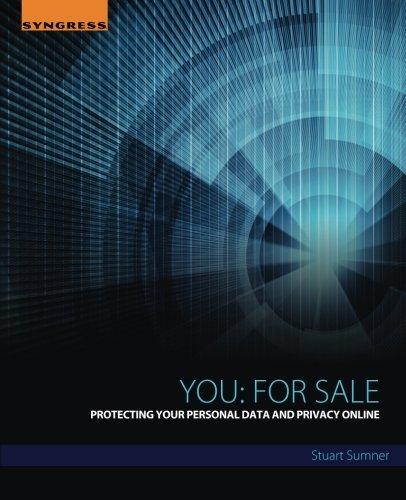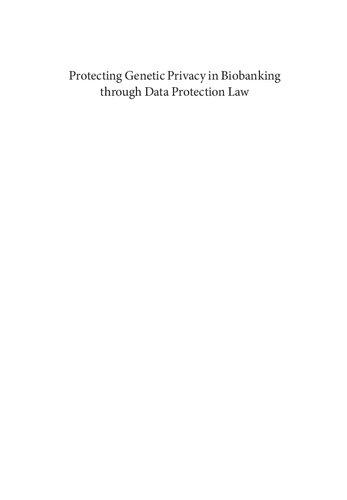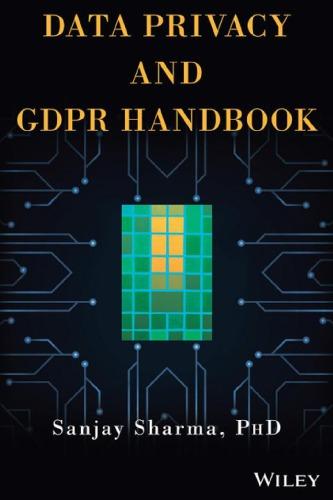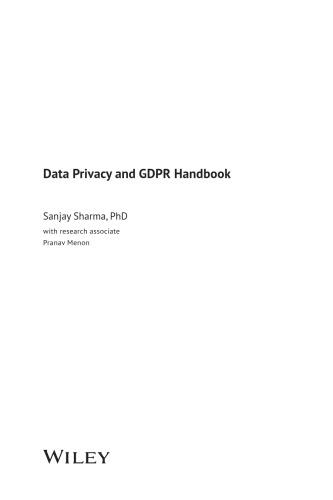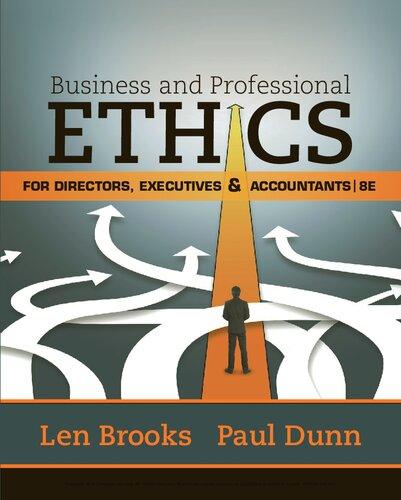https://ebookmass.com/product/you-for-sale-protecting-your-
Instant digital products (PDF, ePub, MOBI) ready for you
Download now and discover formats that fit your needs...
Protecting Genetic Privacy in Biobanking through Data Protection Law Dara Hallinan
https://ebookmass.com/product/protecting-genetic-privacy-inbiobanking-through-data-protection-law-dara-hallinan/
ebookmass.com
Data Privacy And GDPR Handbook 1st Edition Edition Sanjay Sharma
https://ebookmass.com/product/data-privacy-and-gdpr-handbook-1stedition-edition-sanjay-sharma/
ebookmass.com
Data Privacy And GDPR Handbook Sanjay Sharma
https://ebookmass.com/product/data-privacy-and-gdpr-handbook-sanjaysharma/
ebookmass.com
The Music Professor Online Judith Bowman
https://ebookmass.com/product/the-music-professor-online-judithbowman-2/
ebookmass.com
Fundamentals of Athletic Training 4th Edition, (Ebook PDF)
https://ebookmass.com/product/fundamentals-of-athletic-training-4thedition-ebook-pdf/
ebookmass.com
Considering Ethics in Dance, Theatre and Performance 1st ed. Edition Fiona Bannon
https://ebookmass.com/product/considering-ethics-in-dance-theatre-andperformance-1st-ed-edition-fiona-bannon/
ebookmass.com
Mount Sinai Expert Guides: Critical Care 1st Edition Stephan A. Mayer
https://ebookmass.com/product/mount-sinai-expert-guides-criticalcare-1st-edition-stephan-a-mayer/
ebookmass.com
eTextbook 978-0321729712 Biology: Life on Earth
https://ebookmass.com/product/etextbook-978-0321729712-biology-lifeon-earth/
ebookmass.com
Business and professional ethics for directors, executives, and accountants 8th Edition Len Brooks
https://ebookmass.com/product/business-and-professional-ethics-fordirectors-executives-and-accountants-8th-edition-len-brooks/
ebookmass.com
C J Cross
https://ebookmass.com/product/in-the-shadows-the-prophecy-of-darknessand-light-book-1-c-j-cross/
ebookmass.com
Stuart Sumner
Mike Rispoli, Technical Editor
Acquiring Editor: Chris Katsaropoulos
Editorial Project Manager: Benjamin Rearick
Project Manager: Punithavathy Govindaradjane
Designer: Matthew Limbert
Syngress is an imprint of Elsevier 225 Wyman Street, Waltham, MA 02451, USA
Copyright © 2016 Elsevier Inc. All rights reserved.
No part of this publication may be reproduced or transmitted in any form or by any means, electronic or mechanical, including photocopying, recording, or any information storage and retrieval system, without permission in writing from the publisher. Details on how to seek permission, further information about the Publisher’s permissions policies and our arrangements with organizations such as the Copyright Clearance Center and the Copyright Licensing Agency, can be found at our website: www.elsevier.com/permissions
This book and the individual contributions contained in it are protected under copyright by the Publisher (other than as may be noted herein).
Notices
Knowledge and best practice in this field are constantly changing. As new research and experience broaden our understanding, changes in research methods, professional practices, or medical treatment may become necessary.
Practitioners and researchers must always rely on their own experience and knowledge in evaluating and using any information, methods, compounds, or experiments described herein. In using such information or methods they should be mindful of their own safety and the safety of others, including parties for whom they have a professional responsibility.
To the fullest extent of the law, neither the Publisher nor the authors, contributors, or editors, assume any liability for any injury and/or damage to persons or property as a matter of products liability, negligence or otherwise, or from any use or operation of any methods, products, instructions, or ideas contained in the material herein.
ISBN: 978-0-12-803405-7
British Library Cataloguing-in-Publication Data
A catalogue record for this book is available from the British Library
Library of Congress Cataloging-in-Publication Data
A catalog record for this book is available from the Library of Congress
For information on all Syngress publications visit our website at store.elsevier.com/Syngress
Foreword
Everywhere, privacy is under attack. Even those who actively try to protect their own privacy, a dying breed, are no longer safe from intrusion. The ability of companies and governments to extract information, regardless of our protections and liberties, is growing at a fearsome rate.
So even with the powerful tools now available to us, such as encryption, online anonymity is fast becoming a myth.
One of the most worrying aspects of this is the development of groundbreaking pattern recognition technologies, allowing marketing technology firms to identify people regardless of how they identify themselves online. That is to say, even if people try to maintain their anonymity, these programmes can recognise your activities from other data that is held.
Complex programmes now match partial data about people from different sources to create a complete picture. They can do this due to the multitude of data available on everyone, for example from electoral and government records to online surveys.
Even your medical records are now considered fair game by the Government. The UK Government’s temporarily delayed ‘care.data’ scheme would have opened up patients’ records, supposedly anonymised, to a multitude of private bodies, including insurers and research organisations, before objectors forced the Government to rethink its plans. With the advances in pattern recognition, there is no way that the majority of medical records could have been kept anonymous.
Once you know someone’s name, date of birth and postcode, data we all readily give up on request, then it is only a small step to identify further data belonging to that person. For example, I have had my nose broken five times. Once you know that, I’m probably in a group of 100 people in England. Then you figure out when I had my diphtheria jab, usually done shortly after birth. With this two pieces of information it is a simple task to identify me from my
medical records. You wouldn’t even need to rely on the high-tech pattern recognition software in development.
Because metadata can mathematically manipulated, it is susceptible to very sophisticated analysis, and that sophistication increases exponentially every year. Google are already extraordinarily adept at this; several years ago they managed, using their recognition algorithms, to predict the H1N1 outbreak about two weeks ahead of official sources.
And if companies can do it, states certainly can. Although governments across the world are tight-lipped about their intelligence gathering, a number of leaks in recent years have shone a light on some of their clandestine workings. The most obvious of these was the data publicised by Edward Snowden.
The enormity of Snowden’s revelations are often underrated. The sheer scale of surveillance by governments of their civilian populations, and of foreign communications, came as a surprise even to those who were supposedly informed of such matters – including the Parliamentary oversight committee.
Snowden revealed previously unknown, and even largely unsuspected, details of global surveillance apparatus run by the United States’ NSA, together with three of the so-called ‘Five Eyes’ intelligence partners, Australia, the United Kingdom and Canada.
Between the exposure of PRISM, TEMPORA, XKEYSCORE and stellarwind, Snowden showed the world the tip of an iceberg – a global surveillance network designed to catch the personal communications and information not just of terrorists and criminals, but of everyone.
What was so shocking about the revelations was not that such widespread surveillance was being done, but that it was completely legal, and fully sanctioned. Until Snowden, no-one was aware of the shocking extent to which they were under surveillance.
As Sir John Sawers, the ex-head of MI6 recently said, “Snowden threw a massive rock in the pool,” and the ripples have not yet stopped. We must hope that by the time the waters have stilled, Governments, the intelligence agencies and the public debate have all caught up with our ever-changing technological capabilities, and started to understand and respect our digital rights.
But the danger that mass collection of private data poses does not just come from overwhelming the intelligence services with largely useless data. It comes from the power that this data grants over the lives of ordinary citizens. A power that states are unwilling to give up, and too ill-disciplined to resist using. It is not that we are actually watched at all times, but that we could all potentially be watched at any time.
This level of intrusion goes totally against public opinion. Survey after survey show that the vast majority of people are not happy that their communications are monitored by governments, or that their data is hoovered up by companies.
As more and more is known about mass data collection, four things have become clear. Firstly, that people do not like it. Secondly, that the data collected is frequently excessive and is not always used in the interests of the public. Thirdly, the risks inherent in the collection of this data are often very large. Finally, the data collection is often done in a covert or sneaky way. Sometimes this is in the interests of the public, and sometimes it very much is not.
This book is being published at a time when the issues that it addresses are central to the current public debate. Under intense pressure from journalists, from the courts and especially from the public, Britain is having to rewrite the rules on state snooping. All of the organisations involved will have to face up to this shift in public opinion and cope with the inevitable changes.
There is no doubt that big data can be a force for good; it allows markets to run more efficiently, helps for the better provision of services, and plays a large role in our security. But governments will only be able to deliver on this if they accept the need to change their approach to people’s rights and liberties.
This excellent book highlights these points, and brilliantly exemplifies them in an eminently digestible manner. The author’s recommendations are smart and practical: I recommend them to policymakers everywhere.
—David Davis MP
About the Technical Editor
Mike Rispoli is the Press Freedom Director at the U.S.-based media reform organization Free Press, where he oversees campaigns to protect reporters’ rights, promote free speech, and fight government and corporate surveillance. He previously worked at Privacy International, an international advocacy and research organization that fights for the right to privacy, and Access, an international organization that defends and extends the digital rights of users at risk around the world. He lives in New Jersey with his family, and not in a cave in the mountains, despite being aware of all the ways governments and companies can spy on you.
Acknowledgments
There are a number of people who were an enormous help in not just writing this book, but in gestating the ideas, and connecting me to the right interviewees and resources. My memory being what it is, I’m unlikely to give proper credit to all the necessary parties, so apologies in advance to anyone I’ve missed.
The first person I need to thank is Mike Rispoli, who was kind enough to be technical editor on the book. His many insights, and his vast knowledge in the subject area were an incalculable help.
Secondly I’d like to thank Ben Rearick, my editor at Elsevier, and Chris Katsaropolous, also of Elsevier, who put me in touch with Ben. Thanks also go to everyone else at Elsevier who made the whole process so clear and simple throughout.
I’d also like to express a special thank you to David Davis MP, who was kind enough to write the forward. David is a staunch privacy advocate and more figures like him are needed in government.
It would be remiss of me not to thank my interviewees, every one of whom improved the book hugely with their insight. Privacy International were extremely forthcoming with spokespeople and information whenever asked, and special mention too must go to Acxiom, who were happy to speak to me despite the tricky nature of the book’s subject and its relation to their business model.
Finally I’d like to thank Raj Samani for suggesting I write the book in the first place, and my wife for putting up with my need to spend weekends keeping up with my writing schedule instead of chasing after our screaming, unruly children.
Author’s Note
As a journalist I’m lucky enough to be able to spend time with some very wellinformed and interesting people. I recently had lunch with a group of senior technology leaders from various well-known brands across several industries, and soon enough the conversation turned to privacy.
The prevailing view in the group seemed to be one of irritation at what some of them clearly saw as a meddlesome community of privacy advocates, who, in their opinion, were always on the lookout for things to be offended by. ‘So what if someone takes your data, no one really cares,’ was one comment, with which some in the group seemed to agree.
This is concerning, and is one of the reasons I decided to write this book. I can see the perspective of some of those technologists and business people. On the face of it, there is little harm in our data being harvested, even without our knowledge or consent. No one dies or gets ill. You don’t come out in an ugly rash when Facebook logs every action you’ve ever taken on its site. Your hair doesn’t fall out, nor suddenly sprout from unseemly places when Google scans your emails looking for advertising and profiling opportunities.
But what is worrying is the rate and extent of the many erosions of our privacy in the digital age. This rapid wearing down of one of our fundamental human rights might not seem important now, but it does affect lives, and those effects are growing year on year. It influences your credit rating, insurance premiums, medical options, and it feeds a clandestine corporate bonanza seeking to surreptitiously change your behaviour for its own advantage, not yours. And it’s not just private organizations, but governments if anything have their hands even deeper in the data trough.
At the same time much of the existing internet economy revolves around the basic human desire to get something for (at least seemingly) nothing. Web search, and many types of internet services and apps are free to use, and the firms behind them need to recoup their investment somehow. This book doesn’t argue that firms like Google and Facebook should shut down, nor
completely change their business models, but rather that most of their revenue generating activities could be altered to better respect their users’ privacy with little loss of income.
This book aims to present a balanced view of the arguments for and against the current state of digital privacy, and to show the direction of travel. The reader is invited to decide for his or herself how they feel about where we’re going to end up if we stay on this course.
If nothing else, I hope the reader emerges having read this book able to debate the views of some of the technologists I had lunch with that day. Privacy does matter.
Stuart Sumner Summer 2015
WHY ALL THIS FUSS ABOUT PRIVACY?
Does privacy really matter? In fact, do we all agree on what it actually is? As Paul Sieghart said in his 1975 book ‘Privacy and Computers’, privacy is neither simple nor well defined. “A full analysis of all its implications needs the skills of the psychologist, the anthropologist, the sociologist, the lawyer, the political scientist and ultimately the philosopher,” wrote Sieghart.
For our purposes we’ll dispense with the committee necessary for this full analysis, and start with a summary of the definition which came out of the International Commission of Jurists in Stockholm in May 1967:
‘The right to privacy is the right to be let alone to live one’s own life with the minimum degree of interference.’
That statement may be around 50 years old, but it still hits the right note. Then there’s the Universal Declaration of Human Rights, signed by the UN a few years earlier in 1948:
“No one shall be subjected to arbitrary interference with his privacy, family, home, or correspondence.”
Privacy is also enshrined in national laws. Under US Constitutional law it’s considered to be the right to make personal decisions regarding intimate matters (defined as issues around faith, moral values, political affiliation, marriage, procreation, or death).
Under US Common Law (which is the law to come out of the courtroom –where legal precedents are routinely set and followed), privacy is defined as the right of people to lead their lives in a manner that is reasonably secluded from public scrutiny, whether that scrutiny comes from a neighbor, an investigator, or a news photographer’s for instance.
Finally, under US statutory law, privacy is the right to be free from unwarranted drug testing and electronic surveillance. CONTENTS Why all this Fuss About Privacy? ......................... 1 Here’s My Cow, now Where’s My Change?..... 2 Hey I Thought this Lunch was Free!....................... 5
In the UK the legal protection of privacy comes from the ‘Privacy and the Human Rights Act 1998’, which basically corresponds to the rights conferred under the 1948 UN declaration. But the law is changing, and we’ll explore how in chapter 7.
As we shall see, literally every aspect of these definitions of privacy is under attack from both public and private organizations today. Individuals’ privacy is being eroded at an alarming rate. In fact, some commentators are even beginning to ask if there can be such a thing as privacy in a world of cookies, government surveillance, big data and smart cities (to name just a handful of recent technology trends in part culpable for the situation).
And it’s not just commentators and experts who are fretting about the privacyfree world we appear to be unwittingly signing up to. The results of the Pew Research Internet Project of 2014 reveal that 91 per cent of Americans believe that consumers have lost control of their personal information. They trust the government only slightly more; 80 per cent agreed that Americans should be concerned about the government’s monitoring of their communications, which we’ll explore in the next chapter.
A White House Big Data Survey from May 2014 shows that 55 per cent of respondents in the EU and 53 per cent in the US see the collection of big data (which can be used to identify individuals from supposedly anonymized data) as a negative.
Privacy is an aspect of our freedom. It’s about being free to think and act with autonomy, and where desired, without those thoughts and actions being broadcast to others.
This book aims to explain how and why privacy is under threat, and give some basic recommendations for individuals, corporations and governments to follow in order to arrest this slide towards a world that is less free.
HERE’S MY COW, NOW WHERE’S MY CHANGE?
What’s better than a great product at a reasonable price? What about a great product for free? It sounds too good to be true, and it is, and yet that’s the lie that’s repeatedly sold to all of us who use the internet or download apps to our tablets and smartphones. It’s such an obvious duplicity that you’d think more of us would see through it. That we don’t is a result of the way our brains are wired, but before we come to that, let’s have a brief look at the path humanity has taken in its history to bring us to this point.
Next time you pass a dairy farm, you could surprise and delight your friends by remarking that it’s an early form of bank (neither surprise nor delight guaranteed).
That’s because the earliest form of currency is thought to be cattle. If you don’t possess the ability to mint coins or at least make something that’s easy and cheap to reproduce accurately yet hard to copy, a cow is a pretty good substitute. As something which produces milk and can be slaughtered for meat, leather and various other products, it has its own value. Despite small variances in size, one cow is pretty much as valuable as another. You can even get change from a cow – in many early economic systems it was considered to be worth two goats.
This worked well enough for many societies from about 9,000BC to 1,200BC, until they were replaced by Cowrie shells. After all, it’s great having a form of currency you can eat when times get tough, but it’s less good when your entire life savings gets wiped out by disease or is devoured by a pack of wolves or even hungry neighbors.
Cowrie shells – egg-shaped shells belonging to a species of sea snail common to the coastal waters of the Indian and Pacific Oceans - were popular because they were almost impossible to forge, portable, and neither too rare to stymie trading, nor so common that even an egg was worth several wheelbarrowloads (and if that was the exchange rate, how would anyone have transported enough shells to afford the wheelbarrow?). The classical Chinese character for money ( ) originated as a stylized drawing of a cowrie shell, and they are still used today in Nepal in a popular gambling game.
Things became more recognizable to us in modern societies in 1,000BC when China first began to manufacture bronze and copper coins, originally designed to resemble Cowrie shells to help people grasp what they were for. Five hundred years later came electrum (an alloy of gold and silver) coins in Sardis, the capital city of ancient Lydia (an area which roughly corresponds to Turkey today).
Paper money first appeared in China in 806 AD, during the Tang dynasty. It’s interesting to wonder what those financial pioneers would have made of the fact that their idea endures over 1,400 years later.
You might think your credit card is a relatively recent invention, but plastic money has been used in various forms since the late 19th century when celluloid ‘charge coins’ were used by some hotels and department stores to enable transactions to be charged to their clients’ accounts.
Credit cards as we know them now however were first used in September 1958 when Bank of America launched the somewhat unimaginatively named ‘BankAmericard’ in Fresno, California. This eventually became the first successful recognizably modern credit card and nineteen years later changed its name to Visa.
That’s the past, but what of the future of money? Some believe it to be digital currency, the most recognizable example of which today is Bitcoin, an
open-source, online software payment system unaffiliated to any central authority or bank. Anyone can download the software and use their computer to help verify and record payments into a public ledger, sometimes being rewarded with bitcoins themselves for their efforts.
Others see potential in the smartphone as a wallet, with its near-field communication capabilities enabling transactions at the push of a button or simple wave in the air. If you’ve ever suffered the inconvenience of losing your smartphone, or worse having it stolen, then the prospect if it also being your wallet might leave you with a knotted feeling in your stomach and an empty feeling in your bank account, in which case you might prefer the idea of a chip embedded under your skin, or even a barcode branded onto your arm.
There are apps which claim to offer simpler ways of transacting money, and many mainstream services are now diversifying into cash transfers: Facebook, Twitter and Snapchat to name a few.
These would be free services, because nothing is precisely the amount modern online consumers expect to pay for anything. So how would these offerings make money? One way is serving advertising, and another is to sell the data they collect on their customers. Information like what size of transaction you tend to make, when you tend to make them, and what you tend to buy. Snapchat in particular has a sketchy recent history as a guardian of personal data. The popular app (and ‘popular’ hardly does it justice, with over 700 million photos and videos shared each day) allows users to send data in the form of pictures, videos and written messages to one another. So far so pedestrian, but the supposed unique selling point is that the pictures are permanently deleted after a few seconds. Neither the receiver of the image, nor Snapchat itself can retrieve the picture once it has been deleted. Or at least, that’s the idea. In practise it’s the work of moment for a savvy user to make a permanent record whatever appears on their screen – for example by activating the phone’s screenshot mode, or by using a third party app specifically designed for the task (an example of which is SnapBox, an app designed to allow users to keep Snapchat images without the sender’s knowledge). And worse, in October 2014 a hacker published 12.6 gigabytes of images stolen from Snapchat’s users, none of which were ever supposed to have been recorded in the first place.
However in this instance Snapchat itself isn’t to blame. The breach itself occurred when now defunct third party site Snapsaved.com - which contained archived photos and videos from some Snapchat users - was attacked. However, Snapchat itself is guilty of a failure to act when in August 2013 Australian security firm Gibson Security alerted it to a vulnerability. In December that same year Snapchat finally put what it called mitigating features in place to plug the hole, but a few days later a hacking group bypassed the security measures calling them “minor obstacles”, and then released 4.6 million Snapchat
usernames and passwords in via a website called SnapchatDB.info. Snapchat apologized a week later.
But whichever economic system wins out, and the likelihood is that it will be some combination of all of the above, the one certainty seems to be that the illusion of a free lunch will continue.
HEY I THOUGHT THIS LUNCH WAS FREE!
Have you ever downloaded Angry Birds to a mobile device? How carefully did you read the user agreement that flashed up before you started catapulting creatures across the screen? If you didn’t so much as glance at it, then you’re with the vast majority of people, but in this case there is scant safety in numbers, the entire herd is being preyed upon, and most are totally oblivious.
We’re picking on Angry Birds here as it’s a common example, but most of this applies to many of the most common and well-known apps and other online services popular today, and no doubt to tomorrow’s apps currently in development.
By the beginning of 2014 Angry Birds had been downloaded over 1.7 billion times. That’s an incredible figure. According to the population clock at www. worldofmeters.info, there are over 7.2 billion people in the world at the time of writing. So that’s almost a quarter of the entire population of the planet, potentially playing the game. Of course the real figure attacking green pigs with multi-coloured birds is actually less than that, as many people will download the app several times to different devices, but the essential point is that an incredible number of people have downloaded that particular game, and the proportion who read the user agreement is probably significantly fewer than one in a million.
What you’d know if you read it, is that the app makes its money by taking your personal information and selling it on to advertisers. And given that your smartphone is so, well, smart, there’s a real wealth of information for Angry Birds and apps like it to mine.
Your phone knows your location. It knows your routine, where you live, which coffee shop you stop at on the way to work, and of course where you work. It knows the route you take on your commute. It’s got the contact details for just about everyone you know, and if you use it for email, it’s got everything you write to them, and everything they send back to you. It contains your photos, videos, and browsing habits.
Rovio, the developers behind Angry Birds, admits that the data it collects may include but is not limited to your email, device ID, IP address and location. It then sells this data on to advertisers who hope to be better able target you, and sometimes where those third parties have a presence within the app itself, perhaps via an in-app advert, then they can siphon data directly from your phone.
Many apps behave the same way, most gather up way more data than they need, and the vast majority employ very poor or non-existent security. In fact, it’s such a treasure trove of personal information that the security agencies have got in on the act. One of the secrets uncovered by the revelations of former CIA contractor Edward Snowden is the fact that the National Security Agency (NSA) in the US and the Government Communications Headquarters (GCHQ) in the UK have developed capabilities to take advantage of leaky apps like Angry Birds to help them compile their dossiers on their citizens (and those of other countries).
The chances are that you use more than one app on your phone, and between them, the combination of apps and websites we all use gather just about everything we do.
Google is one of the worst offenders. Via its free webmail service ‘Gmail’, Google happily scours what you thought were your private emails looking for keywords, again in order to target ads at you. And it doesn’t stop there, but makes full use of the potential of its wide array of products and services. Google is also able to track you across multiple devices. For example if you use Google Maps on your smartphone whilst out and about, that data will be stored and used to help target you with ads the next time you log into Google at home.
In 2013 a group of users had had enough of Google’s data gathering activities, banded together and sued the company. Their argument was that Google combs its customers’ emails in order to extract a broad meaning – or “thought data” – from them.
“Google creates and uses this ’thought data’ and attaches it to the messages so Google can better exploit the communication’s ’meaning’ for commercial gain,” they said in response to legal counter-action from Google designed to dismiss their case from the courts.
“Google collects and stores the ’thought data’ separately from the email message and uses the ’thought data’ to: (1) spy on its users (and others); and, (2) amass vast amounts of ’thought data’ on millions of people (secret user profiles).”
Google argued that federal and state wiretap laws exempt email providers from liability, as it’s a basic tenet of their business. So there was no attempt to deny the claims, just a shrug of the shoulders and a ‘Yeah, so what?’
“These protections reflect the reality that [electronic communication service] providers like Google must scan the emails sent to and from their systems as part of providing their services,” Google said in its motion.
But the plaintiffs added a further point, and a crucial one. Google does not disclose its “thought data” mining activities to anyone. It’s one thing to take someone’s data in exchange for a valuable service, it’s quite another to do it without permission.
“Google’s undisclosed processes run contrary to its expressed agreements. Google even intercepts and appropriates the content of minors’ emails despite the minors’ legal incapacity to consent to such interception and use. Thus, these undisclosed practices are not within the ordinary course of business and cannot form the basis of informed consent,” the plaintiffs said.
In March 2014, the plaintiffs lost their case. Lucy Koh, a federal judge in California, ruled in favor of Google, at the same time handing a potent defense to every company which takes its users data without their express consent.
There was a similar case in the UK in 2013. A group of internet users sued Google through law firm Olswang, complaining that the search giant had installed cookies (small files designed to track when someone visits a website, and what they do there) on their desktops and mobile devices despite their expressed preference to avoid precisely that activity. The individuals had used a feature in Apple’s Safari browser to block third party cookies.
In this case Google had gone way beyond simply obfuscating its intentions – it had effectively hacked its own users! For a firm whose motto is ‘don’t be evil’, it doesn’t appear to be trying very hard to be good.
Google uses the data contained in these cookies about users’ browsing habits to enable its partners to buy ads targeted at well-defined sections of society, for instance ‘high-earners’, ‘gadget-buyers’, or ‘home owners’. It also sells some of this data on directly to advertisers, once it has been anonymized. However, as we’ll come to later in the book, in the age of big data it’s fairly trivial to identify individuals even from supposedly anonymized information.
There are legitimate reasons why you might not want advertisers to know what you’ve been using the internet for. A teenage girl might search for contraceptive advice, then be embarrassed when related ads come up when her parents are helping her with her homework. A more serious impact to the girl (or boy for that matter) than embarrassment could be a disinclination to search for information on contraception for precisely this reason. Or you might search for a wedding ring, or some other surprise gift for your partner. Do you want similar products then appearing when they sit down to do their own browsing? The situation wouldn’t be so bad if you could opt out, but when the firm in question doesn’t even deign to tell you it’s happening, then there’s a problem.
The Olswang case was brought by 12 Apple users, all of whom had been using Apple’s Safari browser. Google was fined $22.5m (£14.2m) by the Federal Trade Commission (FTC) in the US in late 2012 for exactly the same issueputting cookies onto Safari users’ devices - when a case was brought about by a different group.
Nick Pickles, director of civil liberties campaign group Big Brother Watch at the time, told UK-based newspaper The Telegraph: “This episode was no accident. Google tracked people when they had explicitly said they did not want to be tracked, so it’s no surprise to see consumers who believe their privacy had been steamrollered by corporate greed seeking redress through the courts.
”This case could set a hugely important legal precedent and help consumers defend their privacy against profit-led decisions to ignore people’s rights.“
In August 2013 the Independent, another UK-based newspaper, reported that Google described the case as “not serious… the browsing habits of internet users are not protected as personal information, even when they potentially concern their physical health or sexuality.”
Google had refused to acknowledge the case in the UK, saying it would only recognize it in the US.
The Independent went on to quote Judith Vidal-Hall, a privacy campaigner and one of the claimants, who said: “Google’s position on the law is the same as its position on tax: they will only play or pay on their home turf. What are they suggesting; that they will force Apple users whose privacy was violated to pay to travel to California to take action when they offer a service in this country on a .co.uk site? This matches their attitude to consumer privacy. They don’t respect it and they don’t consider themselves to be answerable to our laws on it.”
It also quoted another claimant named Marc Bradshaw, who argued: “It seems to us absurd to suggest that consumers can’t bring a claim against a company which is operating in the UK and is even constructing a $1 billion headquarters in London.
“If consumers can’t bring a civil claim against a company in a country where it operates, the only way of ensuring it behaves is by having a robust regulator. But the UK regulator, the Information Commissioner’s Office, has said to me that all it can do is fine Google if it breaks the law, but Google clearly doesn’t think that it is bound by that law.”
“Fines would be useless – even if Google agreed to pay them - because Google earns more than the maximum fine in less than two hours. With no restraint Google is free to continue to invade our privacy whether we like it or not.”
We’ll return to Google in chapter 4.
WHY SHOULD WE CARE ABOUT PRIVACY?
But does any of this really matter? The short answer is that it’s up to each individual to decide how much he or she values their privacy – or how accepting they are with faceless corporations trading their most intimate secrets for fractions of a cent.
It’s useful to put this into context by comparing it with our privacy out in the ‘real’, physical world. The following is true story from late 2014. The names have been changed to protect the parties involved.
Ashley, a technology journalist, was waiting in a publisher’s office. He was there to help produce a piece of content encompassing mobility, big data, and other technology trends for one of the publisher’s media brands. To kill time, he was messing around with a few apps on his smartphone, just as many of us do with a few minutes spare.
But what Ashley had that most of us don’t, was access to a brand new service from a UK-based startup. This product enables its customers to rig up a cheap home CCTV system using a few old smartphones, and then allows them to watch the live stream over the internet. Being a technology journalist, Ashley was trialing the service, and had set it up in his home office to test it out. He idly flicked over to the feed. There, caught unknowingly by one of the seemingly dead and redundant phones lying around the room, was Emma, a friend of Ashley’s wife who had been staying with the family. She was rummaging through Ashley’s papers – and not just papers lying around for anyone to see, she was actively rooting through his filing cabinet.
Since smartphone cameras, even ones from a few years ago, boast decent resolution, Ashley was able to clearly make out which drawers she was going through, and even which section of which drawer – all happening live before his disbelieving eyes.
Emma was searching through Ashley’s financial details – bank statements, invoices and salary slips. Ashley watched silently as she pulled out bundles of paper and carefully arranged them on the floor, before sitting cross-legged among them, seemingly ready for a good, long read.
At this point Ashley’s contacts at the publisher turned up, and that was the end of his viewing for now. He was rattled, but as a professional was forced to put it to one side of his mind for the moment to get on with his job.
A natural break in his morning’s work arose some hour and a half later. Checking the feed again, he found Emma still sat in the same place, still going through his private details. What could be so fascinating? What was she looking for that she hadn’t managed to find yet?
These questions and more went through Ashley’s mind as he watched the feed. Should he call the house and confront her? That might stop her going through his papers, but then what would she do, alone in his house with basically nothing to lose, now that her favor with Ashley’s household was basically zero, and her welcome expired?
He called his wife and asked her to ring the house. Not to confront Emma, but just to get her out of his office. He went back to the feed, and soon enough
Emma heard the phone and left the room. Not having installed cameras anywhere else in the house, Ashley watched an empty room for a few minutes. Maybe once out of the room and her concentration broken, Emma would find something else to occupy her, or better still, leave the house.
But no. Moments later, she was back. She resumed her position amongst his personal papers, and carried on reading.
We can imagine how Ashley felt during this ordeal. Violated, betrayed, shaken and angry. He had no business or other financial relationship with Emma, there was absolutely no reason for her to read his financial information. He had by no means given her permission to go into his office, and certainly not to go through his filing cabinet. And yet she had done both, and waited for both he and his wife to be out in order to do so. Clearly she knew it was wrong, and also knew that if she had asked for permission to go through Ashley’s details, it would have been denied.
This is a similar situation to the one in which the various groups to have brought claims against Google in recent years found themselves. A common situation with internet services today is that users don’t give permission for their private information (as browsing habits are defined) to be accessed and sold on to the extent that it is. Sometimes people give permission for some of these activities, but they very really understand the full extent to which their data will be mined, traded, and stored. In the Google cases mentioned in this chapter, the complainants had actively denied permission for their data to be used in this way. In either case, whether users actively deny consent, or simply aren’t sufficiently well informed (if at all) of the full range of activities they’re consenting to, their data is taken and used to generate profit without their knowledge. They are effectively out of the house when Google rifles through their filing cabinets.
Emma’s stay with Ashley’s family ended that night. Not because of her actions, she was always planning to go home that evening. Ashley and his wife decided not to confront her that night because they didn’t want to risk a scene with their children in the house. Instead, Ashley’s wife called Emma the next day.
“Hi Emma. Ash wants to know if you found what you were looking for,” she said, before explaining that her husband had seen everything, and that Emma was no longer welcome to stay with them.
We’re not used to caring as much about digital information as that stored on paper, even when it reveals the same facts about us. Having a stranger break into your house is inevitably more violating than having one hack into your email. Given the choice, who wouldn’t prefer to find that someone had taken over their Facebook account rather than discover that person in their kitchen late at night?
But ask anyone who has had their computer infected by malware, or their email or social media taken over by a hacker, and they’ll tell you it’s unpleasant and disturbing.
CAUTION: HACKERS AT WORK
Another true story, this one slightly more personal as it happened to the author, so we’ll break out into the first person for a moment:
In the summer of 2010 I was at work, in the midst of a lengthy magazine feature. As a displacement activity I checked my Hotmail, to find several messages from friends titled ‘Re: TERRIBLE VACATION.........Stuart Sumne’.
I hadn’t recently had a terrible vacation, and would hardly misspell my own name. I checked a few of the emails in bemusement, still not realizing the obvious. Had a disparate group of my friends, some of whom didn’t even know one another, somehow come together to play a practical joke?
As understanding slowly dawned, my first reaction was indignation that someone had used my email account to send such a badly worded message, full of spelling and grammatical mistakes – as a journalist and editor this was hugely damaging to my personal brand! Even worse, it had begun by describing me as having ‘tears in my eyes’. As if I’d admit I’d been crying to all my friends!
Here’s the original email in full, sent by a hacker:
Subject: TERRIBLE VACATION.........Stuart Sumne
I’m writing this with tears in my eyes,I came down here to HIERRO MADRID SPAIN for a short vacation unfortunately i was mugged at the park of the hotel where i stayed,all cash,credit card and cell were all stolen from me but luckily for me i still have my passports with me.
i ’have been to the embassy and the Police here but they’re not helping issues at all and my flight leaves in few hrs from now but I’m having problems settling the hotel bills and the hotel manager won’t let me leave until i settle the bills..I am so confused right now and thank God i wasn’t injured because I complied immediately.
Well all i need now is just £1,250Pounds you can have it wired to my name via Western Union I’ll have to show my passport as ID to pick it up here and i promise to pay you back as soon as i get back home. Here’s the info you need at western union location below
Receiver name: Stuart Sumne
Amount: £1,250Pounds
Address : Hierro 9, 28045
Country: Madrid,Spain
Kindly email me the transfer details as soon as you have it done.Please let me know if you are heading out to western union now.
Thanks
Love Stuart.
Fortunately very few of my friends were taken in by the con, and those that were sent only their sympathies. What was interesting was that I caught the hack very early on in the process, as it was just starting. I was logged into my account at the same time as the hacker, so I was able to send out simultaneous messages to friends telling them that I was fine, and definitely not to send any money no matter what subsequent messages from my address might claim.
There was even a real-time conversation that afternoon over MSN Messenger, the instant messaging service associated with Hotmail at the time, between the hacker, my cousin, and me. The hacker made his demands, my cousin sympathized, meanwhile I told her to delete me until further notice and respond to nothing until I called her.
The exchange went something like this:
Stuart: Have you sent the money yet? (this was the hacker typing as me)
Cousin: Are you okay?
Stuart: I’m fine, I’ve been hacked, block me! (this was really me)
Stuart: Don’t block me, send the money quickly!
Cousin: What’s going on?
Stuart: I’ve been hacked, block block block! I’ll call you!
From my cousin’s perspective I was suddenly schizophrenic. It was farcical, but worse was to come. I was soon locked out of my Facebook account, then Gmail (like many people I run several email accounts, in part to separate personal and professional lives) soon followed. I had made the rookie mistake of using one password for multiple online services, particularly embarrassing for a technology journalist who specializes in privacy and security. The hacker had no interest in these other accounts, he (it could have been a ‘she’, but statistically speaking it’s unlikely) just wanted control of my main email address for a few hours in an attempt to extort money from as many people as possible. Barring me from other services was simply a way of preventing me from telling my friends not to pay up.
Eventually the day was over and it was time to leave work. I knew that the hacker had changed my passwords, and that once my office computer was switched off, I would be locked out of Hotmail until I could convince Microsoft that I was the account’s true owner. The hacker would have it to himself for as long as that took. I needed to contact him. What I wanted to do was to rage at him for the inconvenience, embarrassment and outrage he’d caused, but that wouldn’t help. Instead, I wrote a polite message to my own email address titled ‘To the hacker’, in which I explained that my friends weren’t falling for the scam, and
to please reset my password to ‘Password’ once he felt his work was done so I could have my digital life back.
The email appeared, unread, in my deleted items folder moments after I sent it. The hacker could have simply ignored it, but was sending me a clear message in return.
It took about two weeks to get all of my accounts back, with as it turned out, Hotmail being the hardest to retrieve. But get it all back I did, with no lasting ill effects, except a lingering feeling of violation. Just because something only exists in the digital ether, doesn’t mean it doesn’t matter.
Interestingly, one of the things I was able to do after I got ownership of my accounts back, was see where my Facebook account had been accessed from. It turned out that the hacker had been just outside a military base in Canada. I was sorely tempted to pay the area a visit, but the likelihood is that I would have found a proxy server operating as part of a botnet, or in layman’s terms, nothing at all.
SERIOUS BUSINESS
Few groups value digital objects as highly as gamers. In March 2005, a Chinese man was stabbed to death in an argument over a sword in online game Legends of Mir 3. Shanghai-based gamer Qiu Chengwei killed his friend Zhu Caoyuan when he learnt that Caoyuan had sold his ‘dragon sabre’ for 7,200 yuan ($720). Chengwei had first gone to the police, but had been told that there was no crime since the weapon did not constitute ‘real property’. Perhaps the outcome might have been different and Caoyuan still be alive had the police recognized the value of virtual property, although of course Chengwei’s actions must be unequivocally condemned either way. He was given a suspended death sentence for his crime.
Police in the Netherlands however, seem to be more prepared to accept the value of digital obecjts. In 2007 a 17-year old man was charged with burglary and hacking after stealing $5,900 worth of virtual furniture in online game Habbo Hotel (now known simply as ‘Habbo’). He managed to steal other players’ passwords by creating fake Habbo sites. This is pretty standard fare for hackers. Making a website which is virtually indistinguishable from another is a simple task for anyone with a small measure of web development experience. For instance, you could register the URL ‘www.Habohotel.com’ (not the subtle difference from the official ‘www.Habbohotel.com’), and make it look identical to the real site. Then, when a few luckless individuals who have mistyped the URL enter their usernames and passwords – hey presto, you’ve got their account details.
This is a classic way to get access to gamers’ accounts on everything from Moshi Monsters to World of Warcraft, and many hacking groups make good profits
this way. It also works perfectly well as a way to procure account details to other services too, including online banking.
Back to our 17-year old Netherlands-based entrepreneur, and he used his illgotten data to log into Habbo Hotel players’ accounts, take their belongings and stash them in his own room in the game, and those of five accomplices. That’s a shade under $6,000 for a few hours’ work, most of us would be delighted with such an effort / reward ratio.
Around the same time, a woman posted an ad on online classified service Craigslist. In it, she offered her body for 5,000 gold in the aforementioned World of Warcraft. Stating that she needed the money to purchase an ‘Epic Flying Mount’ – a way of travelling around the game’s world more quickly – she offered a variety of sexual acts for the virtual currency. Specifically, in her post she said that if someone were to send her an in-game mail with the 5,000 gold pieces attached to purchase the mount, then that person could “mount” her. She later said that her inbox was full by the next day with offers from people willing to comply.
Whatever your thoughts as to the ethics of prostitution, the fact remains that virtual property will always hold real-world value as long as people are willing to exchange real-world services and currency for it.
This is far from a new concept. In 1st century BC, Pubilius Syrus, a Syrian, was brought as a slave to Italy by the Romans. He wasn’t to remain a slave for long though, as he used his wit to win the sympathies of his master, who both freed and educated him. He then found success as a writer, and a performing mime and improviser. In fact that latter pursuit was so successful that he was awarded a prize by Julius Caesar himself in 46 BC for his performance in a public contest.
Pubilius has given us several maxims that we use even today, like: ‘The judge is condemned when the guilty is acquitted.’ More famous, however, is: ‘Something is only worth what someone is willing to pay for it’.
So the fact that something is made up purely of ones and zeroes does not preclude it from holding value. Many people might not think an item in an online game is worth anything at all in the real world, but they’re entirely wrong as long as someone somewhere is willing to pay for it.
But what if this collection of ones and zeroes says something important about us, our habits, preferences, who we are, our relationships, sexual orientation, income and just about everything else besides? That makes its value more obvious, and we should be more vigilant about what happens to that information.
Frank Buytendijk, research vice president at analyst firm Gartner, explains that there are other reasons why we should care about our online privacy.
“There are a lot of companies who think they have an understanding of us,” says Buytendijk. “Personas of us are flying around on the internet, and every one of them delivers a piece of us, but no one really knows exactly what’s out there about you and me.
“Algorithms interpret from a partial point of view about what I do or don’t do, and that might lead to embarrassing situations like pregnancy product coupons being sent to a non-pregnant teenage girl.”
His point is that despite the sophistication of the monitoring and tracking that we each suffer online, there is no one overarching service collating everything. There are multiple companies all striving for the same goal – a complete picture and understanding of us all. But the likelihood is that none of them have that complete picture, meaning that not only do we suffer the injury of having our privacy infringed, but also the insult of being misunderstood!
Buytendijk’s second point, intriguingly, is the opposite of his first. What if these companies don’t have a partial understanding of us? What if one or more of them builds a perfect profile?
“You could have a profile so precise that it starts to influence you,” he says. “So every time I respond to a recommendation because it was spot on, it further sharpens the profile. Then the profile is so sharp I become the slave of the profile. If that profile specifies that I like hamburgers, how will I ever learn to eat Mexican? It will keep me where I am,” he explained, referring to the idea that if we only see special offers and advertising for things we already like, we are less likely to explore the alternatives.
Buytendijk also mentioned identity theft, something which becomes even easier once scarily accurate profiles of us are available for sale online.
“Identity theft is about to overtake normal theft in terms of economic damage. With just a little bit of combination of that fragmented data that’s out there, all of a sudden you don’t have a life anymore,” warns Buytendijk, before concluding “I hope none of this comes true.” We’ll come back to this point around identity theft in Chapter five.
Everything highlighted in this chapter will be explored in more depth later. First, we’ll take a close look at the governments of the US and UK, whose activities, thanks to Edward Snowden, we now know rather a lot about.
References
https://www.hostmerchantservices.com/articles/the-history-of-currency-from-bartering-to-thecredit-card-2/
http://www.forbes.com/sites/cherylsnappconner/2012/12/05/your-privacy-has-gone-to-theangry-birds/
http://www.law360.com/articles/457089/gmail-users-rip-google-s-bid-to-sink-data-harvestingsuit
http://www.law360.com/articles/520437
http://www.telegraph.co.uk/technology/google/9831135/Apple-iPhone-users-suing-Google.html
http://www.independent.co.uk/life-style/gadgets-and-tech/news/google-claims-that-uk-law-doesnot-apply-to-them-8774935.html
http://www.oddee.com/item_96657.aspx
http://www.mondaymorningmtg.com/p/blog-page_21.html#THS

